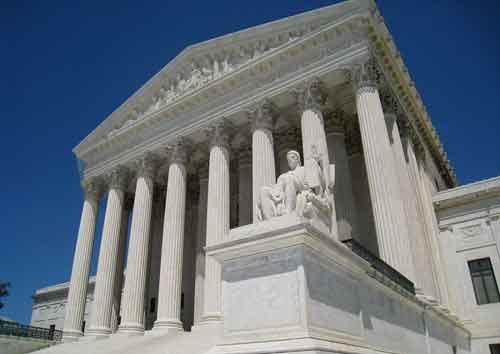“I ended up losing half of my fertility and if I was made to wait any longer, it’s very likely I would have died,” said one Texas patient.
Monday reporting from The Associated Press and newly filed federal complaints highlight how abortion restrictions enacted in U.S. states since the 2022 reversal of Roe v. Wade endanger the health and lives of pregnant people nationwide.
Building on a report published earlier this year ahead of oral arguments in a relevant U.S. Supreme Court case, the AP‘s Amanda Seitz revealed that “more than 100 pregnant women in medical distress who sought help from emergency rooms were turned away or negligently treated since 2022,” according to an analysis of federal hospital investigations.
Legal experts and medical providers argue that “nursing and doctor shortages that have plagued hospitals since the onset of Covid-19, trouble staffing ultrasounds around-the-clock, and new abortion laws are making the emergency room a dangerous place for pregnant women,” Seitz reported. Even when laws make exceptions intended for cases of rape, incest, and emergencies, some doctors and facilities decline to provide care out of fear of state restrictions.
As the AP detailed:
[perfectpullquote align=”full” bordertop=”false” cite=”” link=”” color=”” class=”” size=””]A pregnant patient at a Bakersfield, California, emergency room was quickly triaged, but staff failed to realize the urgency of her condition, a uterine rupture. The delay, an investigator concluded, may have contributed to the baby’s death.
Doctors at emergency rooms in California, Nebraska, Arkansas, and South Carolina failed to check for fetal heartbeats or discharged patients who were in active labor, leaving them to deliver at home or in ambulances, according to the documents.[/perfectpullquote]
Seitz also shared stories from Florida, Idaho, Texas, and Washington. Two women from Texas—Kelsie Norris-De La Cruz and Kyleigh Thurman—had the Center for Reproductive Rights (CRR) file complaints on their behalf with the U.S. Department of Health and Human Services last week. They both had ectopic pregnancies and lost a fallopian tube.
“Despite the fact that my life was clearly in danger, the hospital told me that they could not help me. I ended up losing half of my fertility and if I was made to wait any longer, it’s very likely I would have died,” Norris-De La Cruz said Monday in a CRR statement.
“The doctors knew I needed an abortion, but these bans are making it nearly impossible to get basic emergency healthcare,” she continued. “So, I’m filing this complaint because women like me deserve justice and accountability from those that hurt us. Texas state officials can’t keep ignoring us. We can’t let them.”
Thurman said that “I never imagined I would find myself in the crosshairs of my home state’s extreme abortion bans. For weeks, I was in and out of emergency rooms trying to get the abortion that I needed to save my future fertility and life. This should have been an open-and-shut case. Yet, I was left completely in the dark without any information or options for the care I deserved.”
“Pregnancy is not straightforward, and I now have to live with the consequences of these extreme laws every day,” she added. “None of this should have happened to me, and I want to make sure this doesn’t happen to anyone else.”
Beth Brinkmann, CRR’s senior director of U.S. litigation, asked: “How many more people will nearly die before we see change? These women are proof that exceptions do not make abortion bans less dangerous, even when they are exceedingly clear.”
“Texas law clearly allows for abortions to treat ectopic pregnancies, and federal law requires it,” Brinkmann explained. “Yet, Kelsie and Kyleigh were denied absolutely urgent care. As long as these bans are in place, doctors will be terrified to provide abortions of any kind.”
“It’s impossible to have the best interest of your patient in mind when you’re staring down a life sentence,” she asserted. “Texas officials have put doctors in an impossible situation. It is clear that these exceptions are a farce, and that these laws are putting countless lives in jeopardy.”
The relevant Supreme Court case focuses on Idaho’s strict abortion ban and the Emergency Medical Treatment and Labor Act (EMTALA), a federal law requiring emergency departments that accept Medicare to provide patients with “necessary stabilizing treatment,” which the Biden administration argues includes abortion care.
Two years after reversing Roe with the Dobbs v. Jackson Women’s Health Organization ruling, the high court in June dismissed the Idaho case without ruling on its merits and sent it back to the lower courts. The decision temporarily restored emergency abortions in Idaho but, as CRR said at the time, “still leaves millions of people in states with abortion bans vulnerable.”
In response to the “horrifying” AP reporting and CRR complaints, reproductive rights advocates, including some doctors, called out the Supreme Court’s right-wing supermajority—led by Chief Justice John Roberts—and politicians who installed them and are trying to outlaw abortion care.
“In addition to these individual incidents is the horrifying recognition that they are not one-off consequences of some short-term disaster. They represent a reality created by the Supreme Court that will take a generation at minimum to undo. This is now our status quo,” said Gillian Branstetter, a communications strategist at the ACLU, on her personal social media.
Denver Post opinion editor Megan Schrader declared that “pregnant women are suffering because of the twisted and corrupted jurisprudence of Justices Neil Gorsuch, Samuel Alito, Amy Coney Barrett, Brett Kavanaugh, and Clarence Thomas.”
Dr. Michelle Au, an anesthesiologist and Democratic member of the Georgia House of Representatives for the 50th District, stressed that “standards of care haven’t changed. EMTALA hasn’t changed. What has changed are state laws inhibiting doctors from caring for patients.”
Au took aim at former President Donald Trump, the Republican nominee for the November election, declaring that “Trump did this.”
American Bridge 21st Century, a super political action committee and research group that supports Democrats, similarly said Monday that “Trump overturned Roe and American women are paying the price.”
Although Trump has recently tried to downplay the significance of abortion rights in this cycle and distance himself from some restrictions, recognizing them as politically risky, he has previously backed anti-abortion laws and bragged about appointing half of the justices who[content id=”79272″] overturned Roe. Rights advocates fear what his return to office would mean for reproductive freedom.
Trump and his vice presidential candidate, anti-choice U.S. Sen. JD Vance (R-Ohio), are set to face Democratic Vice President Kamala Harris and her running mate, Minnesota Gov. Tim Walz, on November 5.
Common Dream’s work is licensed under a Creative Commons Attribution-Share Alike 3.0 License. Feel free to republish and share widely.







